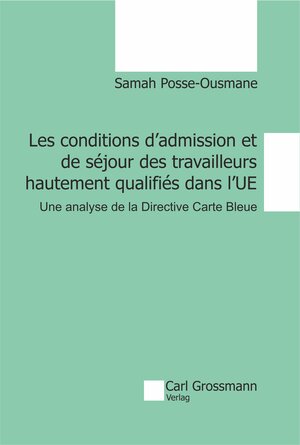
×
![Buchcover ISBN 9783941159136]()
Universités; tribunaux; praticiens et étudiants
Les conditions d'admission et de séjour des travailleurs hautement qualifiés dans l'UE
Une analyse de la Directive Carte bleue
von Posse-Ousmane SamahThis work focuses on the Blue Card Directive, not as a specific instrument, but as an integral part of the EU Immigration Policy Framework. Such an approach is necessary, given the sector-based approach and the legislative patchwork adopted by the EU in the field of Immigration Policy. Moreover, EU law on migration is a new but a very dynamic field which is constantly evolving. Therefore, the project not only analyses the key definitions, central themes and legal issues of the Directive but also examines its interaction and tries to establish some connections with the other EU instruments on legal migration into the EU, most of them adopted on the so-called sector-based approach (Single Permit Directive, Family Reunification Directive, Long-term Residents Directive, Researchers, Students and Others Directive, etc.). In particular, the project tries do draw a parallel between some of the Blue Card Directive provisions and the jurisprudence of the European Court delivered for similar notions or legal problems contained in the others instruments. Furthermore, the PhD thesis addresses other specific issues such us : mobility, the problem of an “ethical recruitment” of highly skilled workers, the volumes of admission (to be set by the Member States), the maintaining of national schemes for highly qualified migrants besides the EU Blue Card and the integration of migrants already admitted in the Member States. The research also takes into account the recent proposal for recasting the Blue Card Directive submitted by the Commission in June 2016 (COM(2016) 378 final). The text is still in early draft form and has not been discussed and adopted, yet. Experience has shown that in the field of EU migration law, there is always a big gap between the project and the final text. Therefore, within the thesis, the proposal is only presented on an indicative basis in order to boost reflection. Lastly, the project outlines the gaps and weaknesses of the Blue Card Directive and proposes some solutions. If some of the issues are specific to the Blue Card Directive, the majority of the problems are the result of the sector-based approach and the legislative patchwork adopted by the EU in the field of Immigration Policy.



